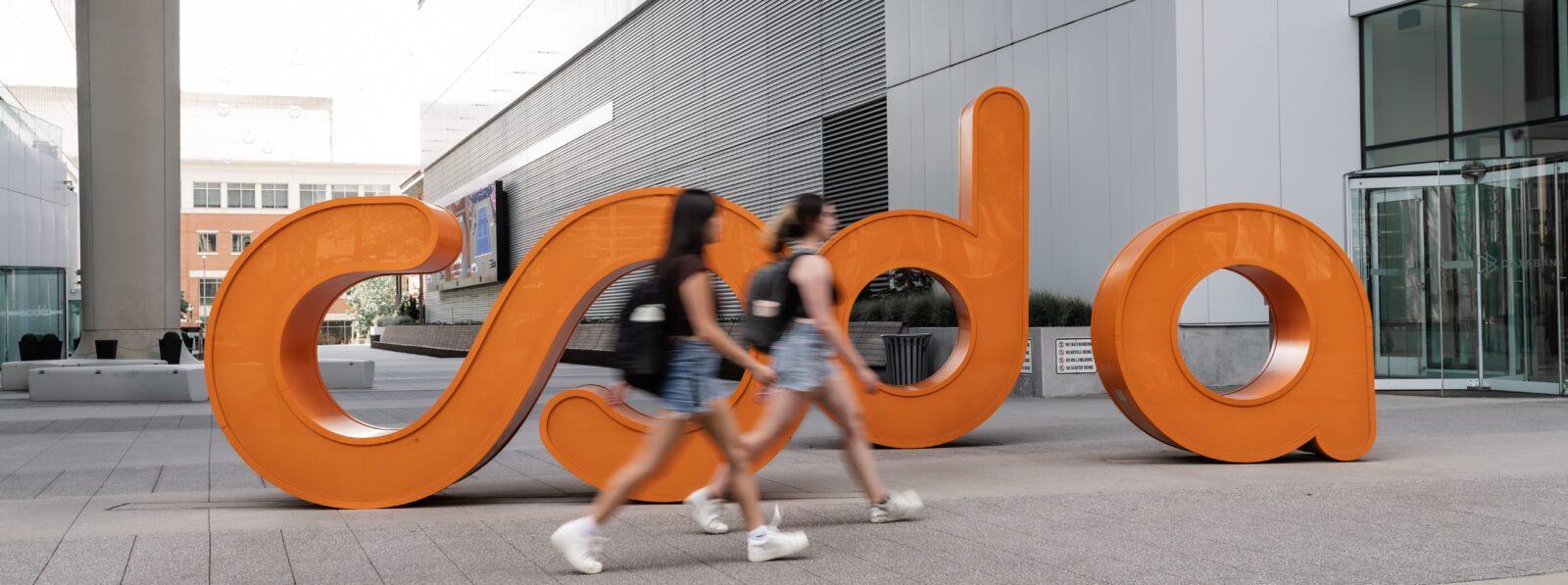Deciding whether to stay on campus or find a spot off-campus? One of the biggest things to consider is how much it’s all going to cost. Seems simple, right? But rental rates aren’t the same everywhere and extra fees and additional costs can completely change the amount you will actually pay each month.
Here at Rambler Atlanta, we get that budgeting for your next school year is a big deal. So, we’re laying it all out in this article, breaking down:
- How student apartments calculate rental rates
- Which factors affect the price of monthly rental rates
- Other fees to consider on top of monthly rental rate
What Expenses Come with Off-Campus Living Near Georgia Tech?
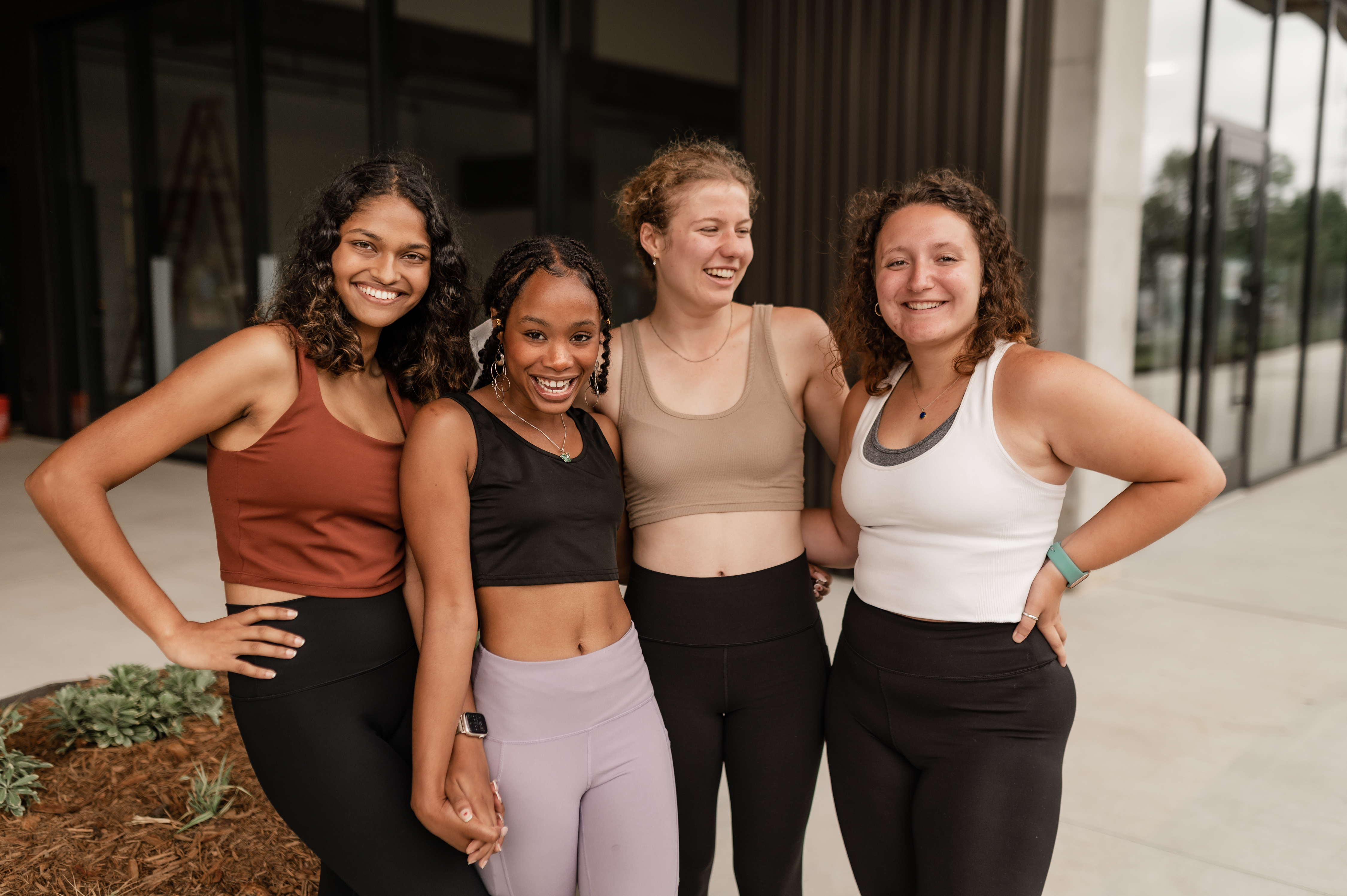
Living near Georgia Tech can cost anywhere from $800 to $2,500 per person, per month. This cost is affected by a number of factors including what type of housing you choose, how updated/new the apartment or house is, how large your room is, what amenities are available, what floor you choose, etc. We explain how these factors will impact your cost of living in the article below.
Read Next: 7 Best Amenities Near Georgia Tech
How Rental Rates are Calculated at Student Apartments
To fully gauge your monthly cost of living effectively, it’s important to understand how apartments calculate their rental rates.
The calculation of your rental rate typically follows one of two approaches, contingent on your chosen housing type.
For traditional houses or apartments, residents sign a collective lease, encompassing the entire unit. All roommates sign a single contract with the landlord, collectively assuming responsibility for rent and potential property damages throughout the lease period.
In student apartments, each roommate individually signs a lease—often referred to as a “by the bed lease”—with the landlord. You are only accountable for your portion of the rent, as stated in the lease agreement. Similarly, your liability extends exclusively to damages within your personal room, bathroom and communal spaces.
Knowing the difference between a traditional lease and an individual lease is important in understanding what your rental rate covers.
It’s also important to note the duration of your lease. In student apartments, it is common to sign a 12-month lease, typically starting in mid-August and ending on July 31st of the next year. While this duration aligns with the majority of student apartment leases, certain apartments may extend early move-in options or offer abbreviated six-month leases to students graduating mid-year or participating in study abroad programs, contingent upon room availability.
On-campus housing often offers nine-month contracts, spanning from mid-August to early May. This arrangement allows students to live on campus exclusively during the Fall and Spring semesters, alleviating concerns about securing a subletter for the summer. However, the downside is that the majority of on-campus housing facilities suspend operations during academic breaks, preventing students from staying during winter break, spring break, etc.
What Factors Can Affect Monthly Rental Rates?
The rates you encounter, whether on or off the Georgia Tech campus, can vary based on many factors. Your rental expenses may be subject to fluctuations dependent on the housing type, the size or appeal of floor plans, the building’s age and individual room features such as windows.
1. Housing Type
The most popular types of housing for Georgia Tech students are:
- Residence halls
- Greek houses
- Student apartment complexes
- Traditional apartment complexes
- Traditional houses
Read Next: What Types of Housing are Available for Students Near Georgia Tech?
Residence Halls
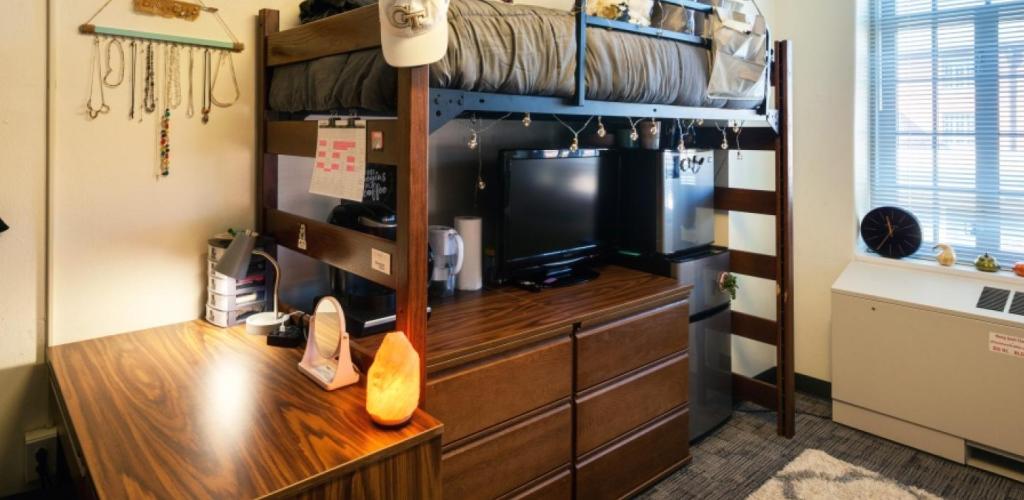
Georgia Tech dorm, Towers Residence Hall on East Campus. Image courtesy of GT Housing and Residence Life.
Residence halls are on-campus living facilities owned and operated by Georgia Tech.
First-year students typically opt for “dorm-style” residence halls offering the quintessential “first-year experience.” Furnished dorms feature compact rooms shared with roommates and communal bathrooms shared with hallmates.
Beyond the first year, Georgia Tech provides apartment-style residence halls. These fully furnished apartments generally consist of four to six bedrooms, incorporating private bedrooms and shared bathrooms.
Situated on campus, all residence halls provide access to Georgia Tech wifi and laundry facilities. Depending on the chosen residence hall, additional amenities may include study spaces, a gym and access to the Georgia Tech meal plan.
For dorms, the meal plan is required for all first-year students when they sign the housing contract. This means that the total cost of living in the dorms, plus the cost for the meal plan totals around $6,705 per semester or $13,410 per year.
For apartment-style residence halls, you have the option to opt into the meal plan, but it is not required. The rate to rent one of these apartments is $9,900 per person annually, not including the meal plan.
It’s important to note that both dorm-style and apartment-style residence halls, along with meal plans, operate on nine-month contracts spanning from mid-August to early May.
For further information about residence halls, refer to the Georgia Tech Housing and Residence Life page.
Greek Houses
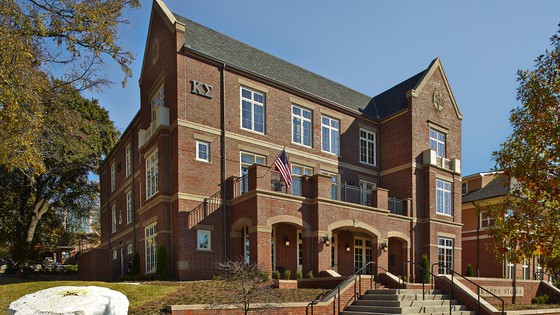
Georgia Tech fraternities and sororities are located across East Campus. Image courtesy of TreanorHL.
The next on-campus housing option is living in Greek houses. With over 40 Greek houses on campus, this option is great for any students closely affiliated with their fraternity or sorority.
Typically, these houses feature smaller rooms accommodating two to four members, sharing community bath spaces. The living conditions and available amenities hinge largely on the specific Greek organization you are associated with.
Similar to residence halls, many sorority and fraternity houses follow a seasonal schedule, often closing or partially closing during the summer. Consequently, housing contracts typically span the nine months of the Fall and Spring semesters. Some Greek houses extend leases for a single semester, accommodating students graduating after the fall semester or planning to study abroad.
Many students opt to live in Greek housing over the summer. Many fraternities and some sororities open rooms for rent to all students, not exclusively their members, often at a budget-friendly rate over the summer semester.
Pricing structures for Greek houses can fluctuate based on your organizational affiliation. These houses typically charge live-in members a lump-sum rate covering rent, utilities, dues and the Greek meal plan for the lease term. Due to this comprehensive fee structure, living in Greek houses often proves more cost-effective than various on- and off-campus alternatives.
Student Apartments
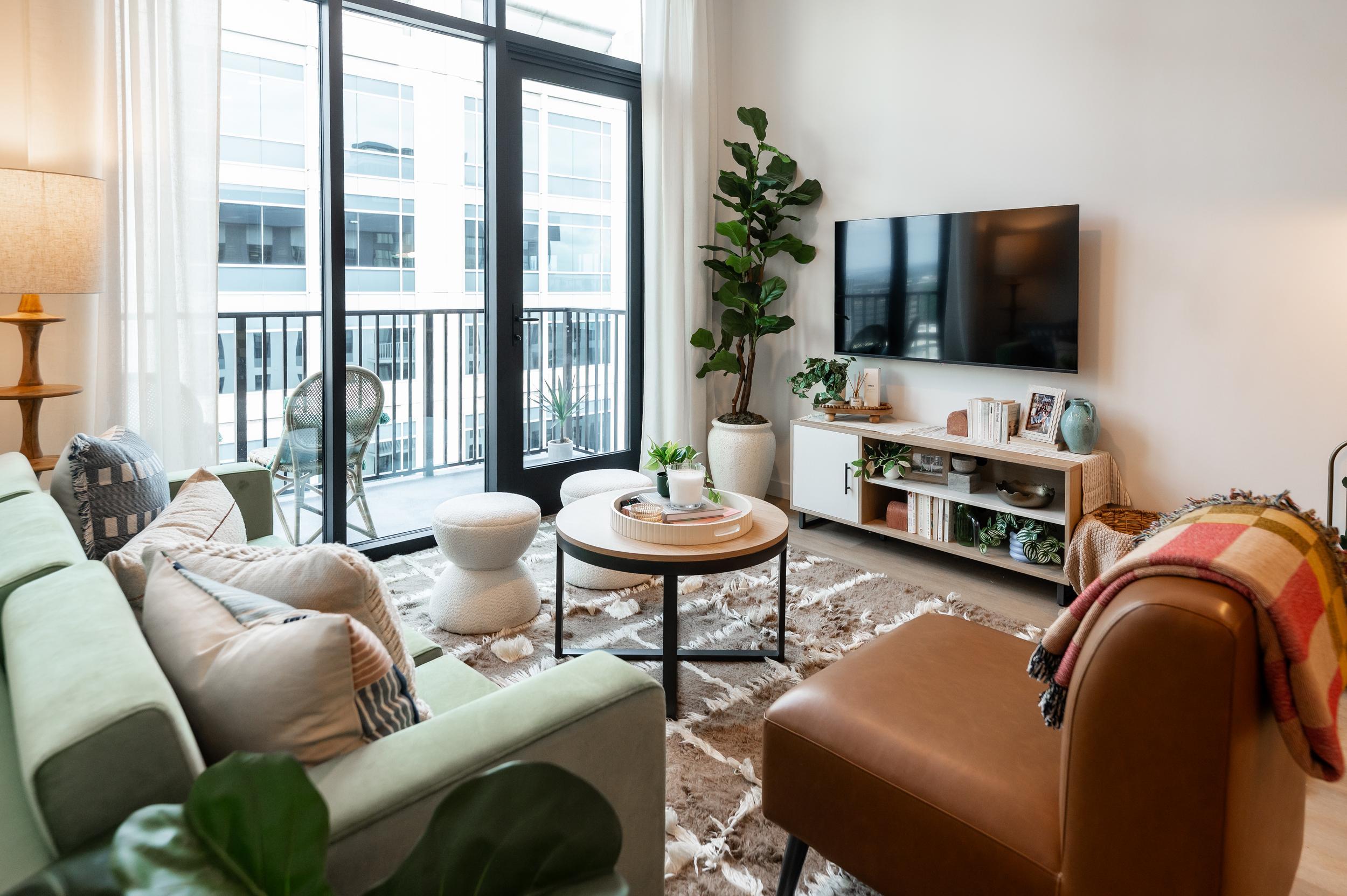
Representative living room featuring Rambler’s standard furniture and finishes.
The most popular off-campus living option near Georgia Tech is student apartments. These upscale apartments are tailored to student needs, offering a comparable price point to on-campus residence halls.
Read Next: 7 Best Apartments near Georgia Tech
Student apartments provide individual leases or by-the-bed leases, ideal for students seeking flexibility in the subleasing process. As a bonus, these locations typically feature trendy, state-of-the-art amenities, including saunas, yoga studios, golf simulators, pool decks, fitness centers and more.
Read Next: 7 Coolest Amenities Near Georgia Tech
Given the relatively recent construction of these student apartments near campus, prices range from approximately $1,200 to over $2,500 per person per month, contingent on factors such as location, amenities, apartment size and more.
Traditional Apartments
The next form of housing is traditional apartments. Unlike student apartments, these locations provide traditional or “by-the-apartment” leases and may offer fewer amenities or amenities less tailored to college-aged students.
Given the diverse range of traditional apartments in Midtown in terms of age, location and target demographic, prices can span from approximately $700 to over $2,500 per person per month.
Read Next: 7 Best Apartments near Georgia Tech
Traditional Houses
The final common option for students seeking off-campus living is traditional houses, most notably houses in Home Park. These houses are available for rent through year-long, traditional leases.
While these houses may lack furniture, amenities and be positioned farther from campus, their pricing typically falls on the lower to mid-range, ranging from $900 to $1,200 per person per month.
2. Floorplans
Once you’ve settled on the preferred type of housing, the next consideration is floorplans.
Floorplans featuring more bedrooms typically come with a lower price per person per month. For instance, a two-bedroom apartment might have a higher rental rate per person compared to a four or five-bedroom apartment.
Apartments with shared bathrooms or less popular floorplans generally come at a more affordable rate.
3. Building Age
The age of the building can influence the overall monthly rental rate, particularly for traditional apartments. Older apartments usually have lower rental rates compared to newer counterparts. Greek houses and traditional houses often fall within a similar pricing range.
While most student apartments in Midtown are relatively new, pricing is generally consistent. For Georgia Tech-owned residence halls, pricing correlates with the tuition rate, not the building age. Despite older structures, the price point increases only with tuition increases. Building age also affects amenities, with newer developments tending to offer trendier and more luxurious features.
4. Unit / Room Features
Considering the features of the individual unit is crucial to determining the rental rate. Beyond bedrooms and bathrooms, the following factors may also affect your cost:
- Is your unit furnished?
- Does the unit have a balcony?
- Do you have your own bathroom?
- Is your bathroom attached to your bedroom?
- Do you have windows in your bedroom?
- Does your unit have a washer/dryer?
- What floor are you on? Are you on a quieter floor? One with better views?
If the answer is ‘yes’ to the above features, you’ll see a higher rental rate.
Additional Fees Added to Your Monthly Rental Rate

When budgeting for the upcoming year, it’s important to factor in costs beyond rent. Additional expenses may include:
- Parking
- Utilities
- Rental Insurance
- Trash
- Moving fees
- Wi-Fi
- Cable TV
- Pet Fees
- Technology Packages
- Security Deposit
Being aware of these costs beforehand is essential for budget preparation.
Read Next: 10 Additional Costs of Living in a Student Apartment in Midtown Atlanta
We hope this article has helped you understand the costs associated with living near Georgia Tech. For any questions or to learn more about Rambler Atlanta, please reach out to our leasing staff. We are happy to help!
